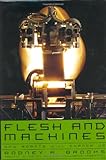His argument is along these lines;
1.) There are things in Mathematics that are non computable and cannot be expressed in algorithms. 2.) We can understand them. To what degree is left unanswered. 3.) Computers are algorithmic. 4.) Hence they can't think and we can.
Perhaps, what we need is a new way to do things not more mathematical models. I once went to a talk by Rodney Brooks# and he pointed out that we don't make a mathematical model of everything, and neither must we expect a computer to do so to accomplish the same task. He argued that we should turn towards simplicity instead of creating complex structures which fail at the slightest breeze. He showed that complexity can and will arise from simplicity.
A fly can execute complex and beautiful maneuvers and yet it does not have a complex nervous system built into it. Whenever we try to make that fly we tend to put in a lot of math and code to compute the flightpath and other such nitty gritties, but the fly cannot do all of that and yet it for now it outperforms and model we make. How? As Mr. Brooks points out perhaps there is nothing more to it than closely connecting the sensors with the actuators. To prove this he set out to make simple machines which didn't do much computation and yet could perform complex behavior that eluded even the best algorithms.
An excellent example of this is Cog. Cog actually started interacting with researchers in games despite having an extremely simple architecture. In fact seeing the videos of Cog and Kismet in action as a 4-6 year old is the reason why I fell in love with AI in the first place. To me it was and still is magic.(See: http://www.ai.mit.edu/projects/humanoid-robotics-group/cog/v...)
This doesn't mean that complex models aren't needed, but instead I think that sooner or later there will be a series Aha! moments that will rephrase this problem. Perhaps, the problem is with us we might not be seeing things in the right way.
I love how Minsky ended things;
>>>No one can tell where that will lead and only one thing's sure right now: there's something wrong with any claim to know, today, of any basic differences between the minds of men and those of possible machines.<<<
#After that, I spent a lot of time reading him up and I highly recommend Flesh and Machines (http://www.amazon.com/Flesh-Machines-Robots-Will-Change/dp/0...) and a few papers (http://people.csail.mit.edu/brooks/publications.html) that he wrote to anyone who wants to understand AI. If someone as moronic as me could understand it anyone can.
[edit: I had a dyslexic d'oh!]


- The Facebook Effect -- well-written insider's account of the history of Facebook and its ambitions. http://www.amazon.com/Facebook-Effect-Inside-Company-Connect...
- The Quantum Enigma -- an accessible digest of quantum mechanics and its philosophical consequences. http://www.amazon.com/Quantum-Enigma-Physics-Encounters-Cons...
- Flesh & Machines -- a lightweight history of robotics and some wacky speculations by MIT's Rodney Brooks. http://www.amazon.com/Flesh-Machines-Robots-Will-Change/dp/0...
- The Language of Life: DNA and the Revolution of Personalized Medecine -- a well-backed account of what is or will be possible in medicine thanks to a better understanding of the genome and increase use of DNA sequencing for prevention, diagnostic, and treatment. http://www.amazon.com/Language-Life-Revolution-Personalized-...
- ... by David Sedaris -- Funny short stories. Perhaps The Santaland Diaries for something light but really amusing, and When You Are Engulfed in Flames for something darker and more well-known. Also, if you like short stories, I heartily recommend Children Playing Before a Statue of Hercules, a varied collection of short stories selected by Sedaris. http://www.amazon.com/David-Sedaris/e/B000AQ3YUW/ http://www.amazon.com/gp/product/0349119759 http://www.amazon.com/When-You-Are-Engulfed-Flames/dp/031615... http://www.amazon.com/Children-Playing-Before-Statue-Hercule...
- Dreams of My Father -- Barack Obama writes candidly and beautifully about his childhood and early adulthood; it's not a political book, and it's worth reading for the writing alone. http://www.amazon.com/Dreams-My-Father-Story-Inheritance/dp/...
- Mathematics: The Loss of Certainty: a chatty history of mathematics, and its perception. http://www.amazon.com/Mathematics-Loss-Certainty-Galaxy-Book...